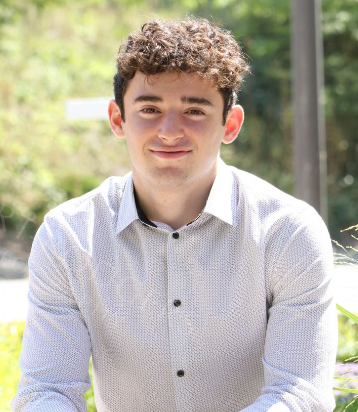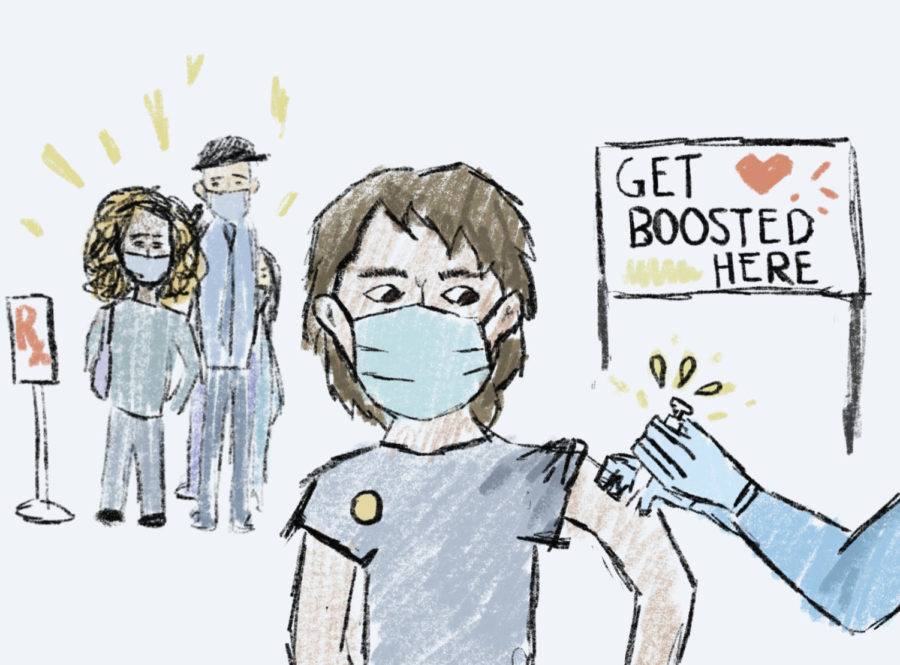Industry professionals, ETHS staff members stress COVID boosters
Following Superintendent Eric Witherspoon’s November intercom announcement imploring proper face mask usage, COVID-19 pandemic and prevention strategies have come into focus again at ETHS. With data such as the weekly average for COVID-19 cases in Illinois rising by nearly 124 percent since the start of the school year and above 92 percent of ETHS students submitting proof of vaccination, a new focus is being given to COVID-19 vaccine booster shots. Currently, anyone 16 years or older who received any of the three COVID-19 vaccines is eligible for a booster.
While many Evanston residents were eager to receive the first doses of the vaccine when they became available, concerns over side effects and questions about the necessity of a third shot caused the community’s willingness to receive the booster to be markedly smaller. This trend worries some ETHS teachers who see the distribution of COVID-19 vaccine boosters as a key step to continuing safe in-person teaching.
“I’ve been fully vaccinated, and I encourage everyone to [get vaccinated]. And I plan on getting the booster,” physics teacher Mark Vondracek said. “It’s my fear and what we’ve seen come to realization with the pandemic is how easy it is to get widespread misinformation. That and the fact that everything’s politicized. A good number of people have become almost anti-science [or] anti-expert in general, so I am a little bit worried. I don’t see a clear pathway to try to fix the problem right now.”
While genuine concerns regarding COVID-19 vaccines and boosters can be concretely addressed, other issues contributing to vaccine hesitancy, such as the politicization of the vaccines, pose a broader concern for ETHS students and teachers who see unifying political leadership as the only long-term solution.
“People have concerns that the vaccine was rushed, but the same trials and regulations that validate other vaccines still happened in this process. It is because of our advances in technology that we were just able to develop vaccines faster than we used to, so it’s not that these vaccines are unsafe or untested,” said chemistry and biology teacher Bill Farmer. “There has also been politicization [of the vaccine], and that’s kind of a unique thing because, normally, vaccines have been a bipartisan issue where everybody agrees that people should be getting [them]. Elected leaders are also spreading misinformation, which is contributing to our lag of vaccination.”
Like many effects of the pandemic, the issue of a lack of access to COVID-19 vaccinations, as well as a lack of access to quality information, has disproportionately affected America’s low-income communities. Federal efforts to address this inequity, such as the Center for Disease Control and Prevention’s COVID-19 Public Education Campaign, are being coupled with campaigns by the pharmaceutical companies that administer the COVID-19 vaccine and boosters.
“We set up [the Vaccine Equity Taskforce] that was responsible for looking at the vulnerable communities across the United States that were disproportionately impacted by COVID 19,” Walgreens Boots Alliance Senior Vice President and Global Chief Diversity Officer Carlos Cubia said. “We said that, as the vaccine was released, we wanted to make sure that we provided access to all of those individuals to get the vaccine. And [we wanted] to dispel any myths or rumors that were associated with people politicizing the vaccine.”
Along with misinformation and politicization, another obstacle keeping people from signing up for vaccine boosters is a lack of clarity on logistics, such as which booster they should get and when they are eligible.
“It was a logistics issue around getting the information out [about] who was eligible to take the vaccine,” Cubia explained. “We don’t have a supply issue right now. What we do have is folks not understanding, ‘Do I need a booster or do you recommend a booster? Do I get a booster every six months now or every year?’”
While such issues with vaccine booster distribution are likely to remain, Evanston residents have a variety of ways to attain a booster. The City of Evanston is advertising the usage of vaccines.gov, on which one can search for booster appointments in Evanston and find over 20 locations with available appointments. The city is also pushing other options to make vaccine boosters accessible, such as using Evanston’s COVID-19 Vaccine Booster Survey to express interest in receiving a booster from a City of Evanston vaccination clinic or calling the city to schedule an appointment.
And while the city urges its residents to receive COVID-19 vaccines and boosters, concerns over rising infection rates still remain.
“The pandemic’s not going to go away if 30 or 40 percent of the population doesn’t get vaccinated,” said Vondracek. “This is just going to linger for a much longer time than it needs to.”
Your donation will support the student journalists of the Evanstonian. We are planning a big trip to the Journalism Educators Association conference in Nashville in November 2025, and any support will go towards making that trip a reality. Contributions will appear as a charge from SNOSite. Donations are NOT tax-deductible.






